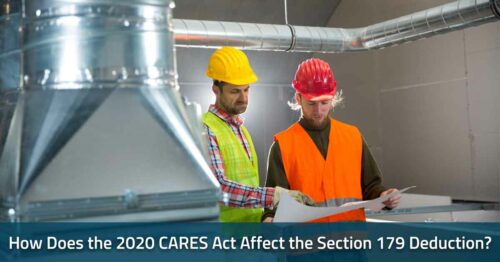Section 179 of the IRS Tax Code has saved many companies a lot of money over the years. While the original provision was created in 1958, the tax code is regularly changed. Section 179 was most recently affected by the 2020 CARES Act, making now a great time to invest in a non-residential facility upgrade.
What is Section 179?
The U.S. Tax Code in Section 179 provides a tax deduction for system upgrades. Specifically, U.S. Code Section 179 states: “A taxpayer may elect to treat the cost of any section 179 property as an expense which is not chargeable to capital account. Any cost so treated shall be allowed as a deduction for the taxable year in which the section 179 property is placed in service. Qualified Real Property applicable includes heating, ventilation, and air-conditioning property.”
Does the 2020 CARES Act Affect the Section 179 Deduction?

Under IRS Tax Code Section 179, installing a new HVAC system provides a tax deduction for the project costs. However, usually, that deduction is spread out over a 39-year period. As a result, only a 2.5 percent tax write-off is allowed each year during that 39-year period.
The CARES ACT, among other things, corrects a drafting error in the Tax Cuts and Jobs Act (also known as TCJA), which consolidated depreciation rules into a single definition called Qualified Improvement Property or QIP. It also changed the rules for depreciation but that failed to include QIP as being eligible for the accelerated 100% bonus depreciation granted by the TCJA.
By correcting this mistake, the CARES Act of 2020 provides a way to help the economy during COVID-19 through “accelerated deductions and opportunities to carry losses back to previous years and obtain refunds.” These two options can also be combined for greater savings.
In other words, the coronavirus relief package allows certain project costs to earn a full deduction in a single year instead of spreading it out over a number of years. So if you’ve been considering any HVAC projects, now is the perfect time to do so.
Facilities That Qualify as QIPs to Attain The Full Deduction Include:
- Office buildings
- Hospitals and other healthcare facilities
- Logistical facilities
- Factories and manufacturing plants
- Other non-residential facilities
Does Your Commercial Facility Qualify for Tax Benefits?
As explained by the Congressional Research Service, equipment purchases are subject to a $2.59 million spending cap for equipment purchases under the CARES Act tax benefit modification of Section 179, and the maximum deduction is $1,040,000. If you’re not sure the upgrade would qualify for the Section 179 deduction, contact us at Donnelly Mechanical for a consultation. The deadline for putting the new equipment into place to qualify for the tax benefit is December 31, 2020, so contact us right away!
Additionally, a Section 168(k) Tax Code bonus depreciation option for eligible equipment and property also exists. Businesses can take advantage of both Section 179 and Section 168(k) Bonus Depreciation allowances at the same time. However, Section 179 must be claimed first. Any costs greater than the $1,040,000 maximum deduction can be taken in the Section 168(k) bonus depreciation.
Needless to say, consult with your tax attorney or tax preparation team before claiming the tax benefits. While the 2020 full deduction is beneficial for many companies, you want to compare it to the depreciation for future years and determine which option is best for your specific needs. This online tax calculator may provide useful information, but your financial team would know best.
Considering an HVAC Upgrade? Contact Donnelly Mechanical Today
At Donnelly Mechanical, we have a team of certified contractors and technicians that are highly experienced in installing, maintaining, and repairing commercial HVAC units, 24/7, 365 days a year. We provide thorough maintenance transition plans to make it easy to switch to Donnelly Mechanical if you aren’t satisfied with your current provider. Better service and peace of mind are a call or email away. Call us at (718) 878-6831 or fill out our form to get started on a plan that works for you.